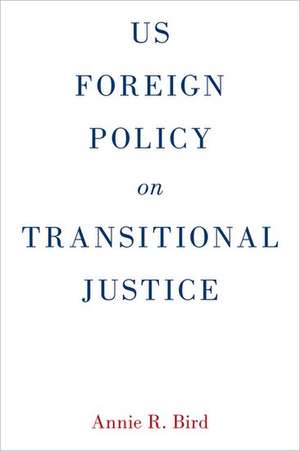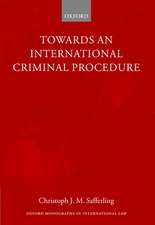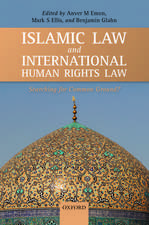US Foreign Policy on Transitional Justice
Autor Annie R. Birden Limba Engleză Hardback – 2 apr 2015
Preț: 280.83 lei
Preț vechi: 348.85 lei
-19% Nou
Puncte Express: 421
Preț estimativ în valută:
53.74€ • 56.26$ • 44.46£
53.74€ • 56.26$ • 44.46£
Carte tipărită la comandă
Livrare economică 25-31 martie
Preluare comenzi: 021 569.72.76
Specificații
ISBN-13: 9780199338412
ISBN-10: 0199338418
Pagini: 238
Dimensiuni: 163 x 239 x 25 mm
Greutate: 0.43 kg
Editura: Oxford University Press
Colecția OUP USA
Locul publicării:New York, United States
ISBN-10: 0199338418
Pagini: 238
Dimensiuni: 163 x 239 x 25 mm
Greutate: 0.43 kg
Editura: Oxford University Press
Colecția OUP USA
Locul publicării:New York, United States
Recenzii
In this timely and engaging book, Bird has identified an important evolution in United States foreign policy priorities since the 1990s: the instantiation of accountability and transitional justice as core diplomatic tools to be deployed in the response to conflict and mass violence. Through original research and the lens of several emblematic case studies, Bird traces the way in which these imperatives became concrete policy in the face of countervailing equities, inter-agency dissension, and sheer bureaucratic inertia. The book offers important insights into how the idea of justice can inform and inspire governmental action while also advancing other more hard-edged foreign policy priorities.
This is an important study of a critical topic - the approach of the USG to transitional justice. The focus on the role of bureaucratic interests and of key individuals is a significant contribution to the literature.
Transitional justice has been studied from a legal, historical, and philosophical perspective: distilling legal principles, filling in the historical record, and debating principles of responsibility, retribution, and the danger of victor's justice. Annie Bird offers a useful framework for thinking about transitional justice as a distinctive category of foreign policy, allowing us to make sense of U.S. support for transitional justice across multiple administrations and laying a promising foundation for comparative study of a new category of diplomacy.
For an illuminating view of the hitherto untold story of American policy on justice-related decision-making values and interests at stake in periods of political transition, read this book!
The United States has played a significant role on issues of post-conflict accountability for the last century, but particularly since the mid-1990s when international criminal justice was 're-born.' In this unique book, Annie Bird traces this history and explains the surprisingly consistent principles that have underpinned US policy, while also exploring the differences that have characterized the approaches taken by successive administrations. In short, she does a masterful job making sense of policies that may not be obvious to the outside world.
This book's systematic approach to United States support (and sometimes lack thereof) of accountability for mass atrocities committed in various countries is a welcome exploration of the expanding field of transitional justice. Especially valuable are the country studies that illustrate the finding that US policy on this matter has been symbolic, retributive and strategic. All three characteristics are positive and negative at the same time. Undoubtedly - if inconsistently - the United States has contributed to the idea that some crimes are so egregious that they cannot go unpunished.
This is an important study of a critical topic - the approach of the USG to transitional justice. The focus on the role of bureaucratic interests and of key individuals is a significant contribution to the literature.
Transitional justice has been studied from a legal, historical, and philosophical perspective: distilling legal principles, filling in the historical record, and debating principles of responsibility, retribution, and the danger of victor's justice. Annie Bird offers a useful framework for thinking about transitional justice as a distinctive category of foreign policy, allowing us to make sense of U.S. support for transitional justice across multiple administrations and laying a promising foundation for comparative study of a new category of diplomacy.
For an illuminating view of the hitherto untold story of American policy on justice-related decision-making values and interests at stake in periods of political transition, read this book!
The United States has played a significant role on issues of post-conflict accountability for the last century, but particularly since the mid-1990s when international criminal justice was 're-born.' In this unique book, Annie Bird traces this history and explains the surprisingly consistent principles that have underpinned US policy, while also exploring the differences that have characterized the approaches taken by successive administrations. In short, she does a masterful job making sense of policies that may not be obvious to the outside world.
This book's systematic approach to United States support (and sometimes lack thereof) of accountability for mass atrocities committed in various countries is a welcome exploration of the expanding field of transitional justice. Especially valuable are the country studies that illustrate the finding that US policy on this matter has been symbolic, retributive and strategic. All three characteristics are positive and negative at the same time. Undoubtedly - if inconsistently - the United States has contributed to the idea that some crimes are so egregious that they cannot go unpunished.
Notă biografică
Annie Bird is a Fellow at the American Association for the Advancement of Science. She previously worked at the International Center for Transitional Justice, UNICEF, Benetech, the Judicial System Monitoring Programme, and other organizations in West Africa, Southeast Asia and Latin America. She has also taught at the University of California-Berkeley and the London School of Economics.















